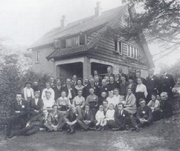- International Fellowship Of Reconciliation
-
International Fellowship of Reconciliation
L'International Fellowship of Reconciliation – IFOR (Mouvement international de la réconciliation – MIR) est un mouvement non-violent inter-religieux. Il est issu de la promesse que se sont fait en août 1914, sur le quai de la gare de Cologne, deux chrétiens pacifistes, le quaker anglais Henry Hopkins et le luthérien allemand Friedrich Siegmund-Schultz, de ne pas participer à la Première Guerre mondiale qui venait d'éclater.
Lilian Stevenson écrit que « le mot intraduisible de Fellowship a un sens plus mystique que le terme de Mouvement. Il s'applique à une compagnie de gens qui se sentent en communion les uns avec les autres et forment une famille spirituelle »[1].
Sommaire
Une Internationale non-violente
Les premières branches nationales du MIR sont l'anglaise et l'américaine, fondées en 1915. L'internationale (IFOR) a été fondée en 1919 à Bilthoven, aux Pays-Bas. La branche française (Mouvement international de la Réconciliation) est fondée en 1923 à Paris.
A sa fondation, ses premiers membres appartenaient aux Eglises protestantes et particulièrement aux Eglises historiquement pacifistes, quakers et mennonites. Le mouvement s'est ensuite ouvert aux catholiques puis, dans les années 1970, à l'occasion de création de branches en Asie et au Moyen-Orient, à des membres de différentes religions (juifs, musulmans, bouddhistes).
Né contre la Première guerre mondiale, IFOR se définit d'abord comme un mouvement chrétien pacifiste. La rencontre de plusieurs de ses membres avec Gandhi conduisit le mouvement à se déclarer non-violent dès les années 1920.
Le mouvement est aujourd'hui présent dans une cinquantaine de pays.
Son siège est à Alkmaar (Pays-Bas) et sa présidente d'honneur est Hildegard Goss-Mayr. IFOR dispose d'un statut consultatif auprès de l'ECOSOC de l'ONU et auprès de l'UNESCO. IFOR est membre de la Coordination internationale pour la Décennie de la culture de paix et de non-violence.
Prix Nobel de la Paix
Ce mouvement comprend six Prix Nobel de la paix :
- Jane Addams (1931)
- Emily Greene Balch (1946)
- Albert Luthuli (1960)
- Martin Luther King Jr. (1964)
- Mairead Corrigan Maguire (1976)
- Adolfo Pérez Esquivel (1980)
Notes et références
- ↑ Lilian Stevenson ; préf. de Leonhard Ragaz, Réconciliation : une Internationale chrétienne [« Towards a Christian international [...] »], Ed. de "La Réconciliation", Pantin (Seine), 1929, 194 p.
Annexes
Articles connexes
- Mouvement international de la Réconciliation – branche française
- Rencontres de Bilthoven
Liens externes
Catégories : ONG promotion de la paix | Association ou organisme lié à la non-violence | Association pacifiste | Association fondée en 1919
Wikimedia Foundation. 2010.

